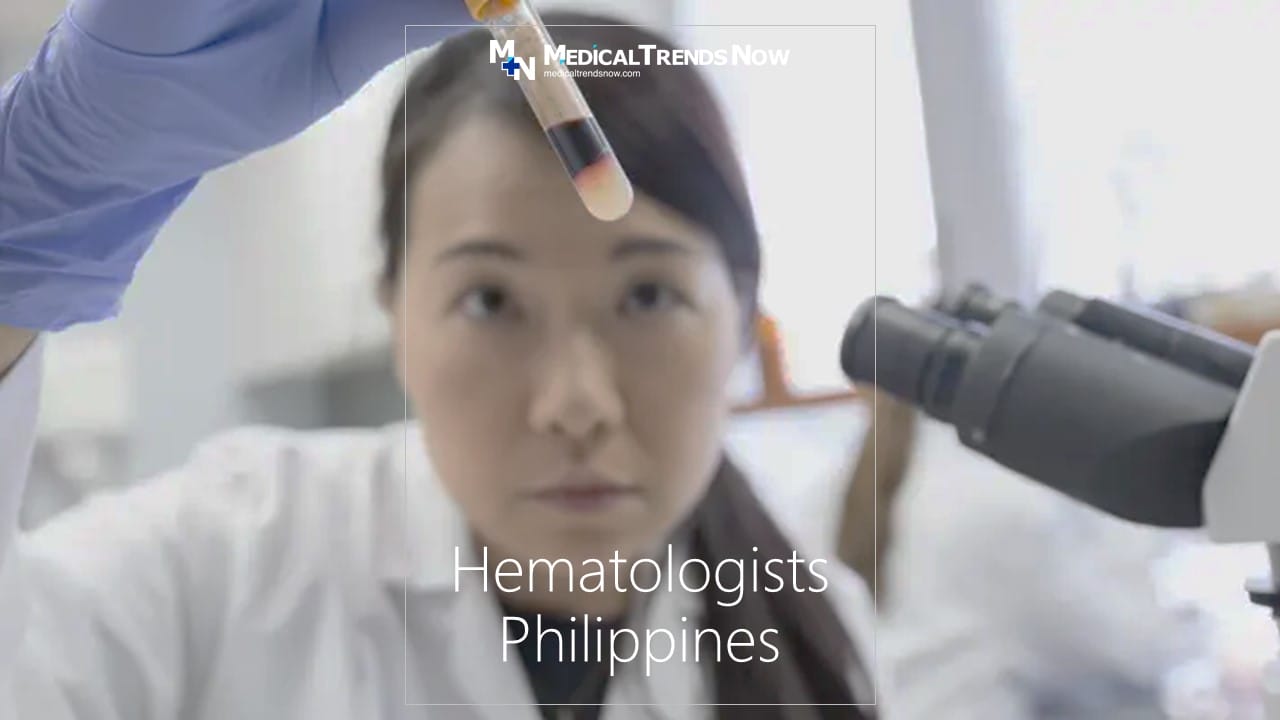Table of Contents
Hematologists in the Philippines provide blood tests and other medical services to patients. Hematologists use blood tests to diagnose and treat diseases. The hematology department at a hospital in the Philippines is likely to offer blood tests for conditions like leukemia, anemia, and thrombocytopenia.
Hematology is the study of blood and blood-forming organs. A hematologist would perform a hematological test, such as a hemoglobin level or complete blood count (CBC).
Here’s everything you need to know before visiting hematologists in the Philippines.
What is Hematology?
Hematology is the study of blood and blood-forming organs. It includes diagnosing and treating diseases and blood disorders, including leukemia, lymphoma, myeloma, anemia, and other conditions.
Hematologists also perform blood tests to monitor the health of the blood system.
What is a Hematologist?
Hematologists in the Philippines are physicians who specialize in diagnosing and treating blood diseases. Hematology doctors typically work in hospitals, clinics, or research centers. During the global pandemic, there were many hematologists in the Philippines who were simultaneously working in hospitals, laboratories, and private home practice.
Hematologists in the Philippines typically perform hematologic tests, such as a complete blood count (CBC), hematocrit (HCT), or a basic cell count (BCC), to diagnose and monitor diseases or to screen for abnormalities. Filipino blood doctors also may perform blood transfusions.
What is a Complete Blood Count Test (How CBC Test Works)?
A complete blood count test is a medical procedure used to measure the number of blood cells in a person’s blood. It is also known as a hematology test or CBC test.
The CBC blood test will allow hematologists in the Philippines to determine the number and type of white blood cells, red blood cells, and platelets in the patients’ blood.
The CBC blood test is a routine medical test that can also perform identification for infections and screening blood tests that will enable hematologists in the Philippines to diagnose leukemia.
What is HCT Blood Test?
Hematologists in the Philippines use a hematology blood test called a hematocrit (HCT). Hematocrit will determine how many red blood cells are in a patient’s blood.
Hematocrit measures the percentage of red blood cells in a sample of blood. This test will determine the level of iron in the blood. Likewise, hematocrit can diagnose and monitor conditions that affect the red blood cells, such as anemia.
What is Hemoglobin Blood Test?
Hemoglobin is a protein that carries oxygen throughout the body. People need to have enough hemoglobin because it helps carry oxygen to the cells and tissues. Doctors measure the hemoglobin level in a person’s blood to determine whether they are healthy or have an illness. Hematologists in the Philippines use a variety of tests, such as hematocrit and blood cell count, to determine how well a person’s body is functioning.
This test can determine the level of hemoglobin in a person’s blood. Hemoglobin is a protein that helps carry oxygen throughout the body.
Why Doctors Perform a Blood Test on a Patient?
Hematologists in the Philippines perform blood tests on patients for various reasons. Blood tests can help hematology doctors diagnose medical conditions, monitor a patient’s health, and determine the best course of treatment.
Blood tests are essential for hematologists in the Philippines to perform on patients because they can help diagnose early detection of diseases, prevent ailments, and monitor patients’ health. Hematologists in the Philippines use a variety of medical machinery, tools, and equipment to extract data from CBD and HCT tests accurately.
Why Do Patients Need to Visit a Hematologist?
Hematologists are physicians who specialize in the diagnosis and treatment of blood diseases. Blood diseases can be caused by various factors, including infections, genetics, and environmental exposures. When a patient has a blood disease, they may experience symptoms such as fever, chills, fatigue, and shortness of breath. If left untreated, blood diseases can lead to serious health complications.
To diagnose and treat blood diseases effectively, patients often need to visit a hematologist. Hematologists in the Philippines can perform various tests to determine whether a patient has a blood disease and choose the best course of treatment. Hematologists in the Philippines can also provide information on other blood diseases, such as leukemia and lymphoma.
List of Hospitals, Clinics, CBC Labs, and Hematologists in the Philippines:
Here are some hospitals, clinics, CBC laboratories, and hematologists in the Philippines. No need to search on Google “blood doctor near me.” We have done that for you.
Just click below to visit their websites:
- Philippine College of Hematology and Transfusion Medicine (A complete list of hematologists in the Philippines)
- National Kidney and Transplant Institute (NKTI)
- St. Lukes Medical Center
- Philippine Children’s Medical Center
- Cardinal Santos Medical Center
- Chong Hua Hospital
- University of Cebu Medical Center
- Mount Grace Hospitals
- ACE Allied Care Experts Medical Center
- DLSUMC
- Manila East Medical Center
- The Medical City
- Ippokratis
- University of Santo Tomas Hospital
- Davao Doctors Hospital
Organizations: Hematologists in the Philippines
Here are some of the organizations and associations advancing the field of hematology in the Philippines.
- Philippine College of Hematology and Transfusion Medicine
- Philippine Medical Association
- Hemophilia Philippines
List of Blood Diseases
Here’s a list of common blood diseases among Filipino patients.
Leukemia
Leukemia is a blood disease that affects white blood cells. It is a type of cancer that starts in the bone marrow and can spread to other body parts. There are three main types of leukemia: acute lymphoblastic leukemia (ALL), chronic lymphocytic leukemia (CLL), and myelodysplastic syndrome (MDS). ALL is the most common form of leukemia, and it affects children and young adults. CLL is more common in adults, while MDS is more common in older adults.
Myeloma
Myeloma is a blood disease that affects the bone marrow. The myeloma cells form tumors (germ cell tumors) in the bone marrow and can spread to other body parts. Myeloma can affect any age but is most common in older adults. Treatment options include chemotherapy and radiation therapy.
Eosinophilic leukemia
Eosinophilic leukemia is a type of leukemia caused by the abnormal growth of eosinophils, a variety of white blood cells. Eosinophilic leukemia is most commonly found in young adults but can also occur in children and older adults. Eosinophilic leukemia can be difficult to diagnose because it may not cause any symptoms until it has progressed to a more advanced stage. Treatment for eosinophilic leukemia typically involves chemotherapy and/or radiation therapy.
Acute myeloid leukemia
Acute myeloid leukemia (AML) is a cancer of the blood and bone marrow. It is a type of leukemia that begins in the white blood cells, called lymphocytes. AML is most commonly diagnosed in adults over the age of 50, but it can also occur in children and young adults.
Acute myeloid leukemia (AML) is a type of leukemia that starts in the white blood cells, called lymphocytes. The leukemia cells can overgrow and spread to other parts of the body.
AML’s possible treatments include chemotherapy and radiation. If it is not treated, it can lead to death.
Chronic myeloid leukemia
Chronic myeloid leukemia (CML) is a type of leukemia that affects white blood cells. It is the most common form of leukemia in adults and the fifth most common cancer globally. CML is a type of leukemia that affects the blood and bone marrow.
CML is often diagnosed in people over age 50, but it can occur at any age. It is a long-term cancer that can develop over many years.
The most common treatment for CML is a combination of chemotherapy, radiation therapy, and other technological advances are also available. However, there is no known cure for CML, but it can be medically managed by a team of physicians.
Aplastic anemia
Aplastic anemia is a blood disorder where the bone marrow does not produce enough red blood cells. This can lead to a shortage of oxygen in the body and cause serious health problems. Aplastic anemia is most common in young adults, but it can also occur in older adults.
Hemolytic uremic syndrome (HUS)
Hemolytic uremic syndrome (HUS) is a severe complication of kidney disease that can lead to kidney failure. The most common form of HUS is caused by a bacteria called Escherichia coli (E. coli). E. coli can enter the body through the nose, mouth, or rectum and cause inflammation in the kidneys. This inflammation can damage the kidneys’ cells and lead to kidney failure. HUS usually occurs in people with chronic kidney disease taking dialysis or having had a recent blood transfusion. It can also occur in people without any known kidney disease taking antibiotics or other medications that may weaken their immune system.
Erythroblastosis fetalis
Erythroblastosis fetalis, also known as erythroblastosis neonatorum or simply erythro, is a rare and life-threatening condition that destroys a baby’s red blood cells. The cause is unknown, but it’s believed to be caused by a virus or other environmental exposure. Symptoms can include high fever, jaundice (yellowing of the skin and eyes), and shortness of breath. If left untreated, erythroblastosis fetalis can lead to serious health problems, including death.
Thalassemia major
Thalassemia major is a blood disorder that affects the red blood cells. The disorder results from a lack of normal thalassemia genes. Symptoms of thalassemia major may include anemia, fatigue, and easy bruising. Treatment typically includes regular blood transfusions and medications to help the body produce more red blood cells.
Sickle cell anemia
Sickle cell anemia is a genetic disorder that affects red blood cells. The red blood cells are shaped like crescent moons and cannot carry oxygen from the lungs to other parts of the body. Sickle cell anemia is most common in African descent, but it can also occur in people of Hispanic, East Indian, and Mediterranean descent.
Hemophilia
Hemophilia is a blood disease that results from a lack of clotting factors. Clotting factors are proteins that help prevent blood from flowing out of an injury. Hemophilia affects about 1 in 5,000 people and is the most common inherited bleeding disorder. Hemophilia can cause severe bleeding episodes, including spontaneous bleeding (during surgery or childbirth), nosebleeds, and even death. People with hemophilia need regular blood tests to monitor their condition and ensure that they receive the correct clotting factor therapy level.
Lymphoma
Many blood diseases can affect people in the Philippines. These diseases include leukemia, lymphoma, myeloma, and other cancers. Hematologists in the Philippines typically perform hematology tests such as HCT (haematocrit or hematocrit) and CBC (complete blood count) to help diagnose these diseases.
What are Hematological Disorders?
Hematological disorders are a group of medical conditions that affect the blood. They can be caused by various factors, including infections, cancer, and genetic abnormalities. Hematological disorders can lead to serious health problems if not treated properly.
Hematologists in the Philippines are responsible for diagnosing and treating hematological disorders. They often perform blood tests to check for signs of disease and recommend treatment options. Hematologists are essential members of healthcare teams in the Philippines, and their work is vital in helping prevent serious health problems.
What are the Symptoms of Blood Disorder to a Patient?
Many different blood disorders can affect a person’s health. Some of the most common symptoms of blood disorders include fever, fatigue, shortness of breath, chest pain, and swollen glands. If you are experiencing any of these symptoms and you think that you may have a blood disorder, it is essential to get checked out by a doctor.
What are the Common Treatments for Hematological Blood Disorders?
There are a variety of treatments for hematological blood disorders, depending on the cause and severity of the condition. Treatment options may include medications, surgery, or a combination of both. Some common treatments for hematological blood disorders include:
Medications
Some medications are used to treat specific conditions or symptoms related to hematological blood disorders. These medications can help to improve the patient’s overall health and quality of life.
Surgery
Surgery may be necessary to correct a hematological disorder. This can include procedures such as bone marrow transplantation or liver surgery.
A combination of therapies
A combination of therapies may be the best option for some patients with hematological blood disorders. This includes treatments that use both medications and surgery.
There are a variety of treatments for blood disorders, depending on the underlying cause. For example, antibiotics may be prescribed if a person has an infection. If the disorder is due to a problem with the blood’s ability to clot, medications may help thicken the blood or help it clot more quickly. In some cases, surgery may be necessary to remove the blockage or fix the underlying problem.
What Causes Blood Disease?
There are many causes of blood disease, but the most common are infections, such as viruses and bacteria. These infections can cause inflammation and damage to the blood vessels, leading to serious health problems. Other causes of blood disease include cancer, which can spread to the blood vessels and cause blockages, and lifestyle factors such as obesity or smoking.
What to Expect When A Patient Visit a Hematologist?
When patients visit a hematologist, they may expect to undergo a hematology consultation. The hematologist will review the patient’s medical history during this appointment and perform a hematology test, such as a complete blood count (CBC) or platelet count. The hematologist may also order tests to determine the cause of the patient’s symptoms.
Patients may expect to have their blood drawn for a hematology test (HCT or CBC) and receive other blood tests. Depending on the HCT or CBC results, the doctor may prescribe medications or recommend further treatments.
How to Become a Hematologist
Being a hematologist in the Philippines can be pretty challenging, as there is a lack of Hematology specialists in the country. However, with hard work and dedication, anyone can become a hematologist. Requirements for becoming a hematologist include an undergraduate degree in medical sciences or a related field, completion of a Hematology fellowship program, and board certification by the Philippine Regulatory Commission.
Latest Medical Equipment and Technologies Used by Hematologists in the Philippines
Hematologists in the Philippines are using the latest medical equipment and technologies in blood tests. Hematologists use a variety of blood tests to diagnose and treat patients. Some of the most common blood tests used by hematologists include hematocrit (HCT), complete blood count (CBC), and serum biochemistry panel (SMP). Hematologists also use other tests, such as cytology to detect and diagnose cancer.
Hematology cytology is a diagnostic test that uses a microscope to look at cells in a blood sample. CBC blood tests measure the number of different types of cells in a person’s blood.
Summary: Hematologists in the Philippines
The Philippines has a population of over 100 million people and is one of the most densely populated countries globally. There is a high demand for medical services, and Hematologists are in high demand. Hematologists in the Philippines can make a very lucrative career, as there is an increasing trend of people traveling to the Philippines for medical treatments.
Hematologists in the Philippines provide diagnostic and treatment services for blood diseases. Hematologists use a variety of tests to diagnose blood diseases, including hematocrit (HCT), complete blood count (CBC), and platelet count. Hematologists also use treatments to treat blood diseases, including chemotherapy and radiation therapy.














